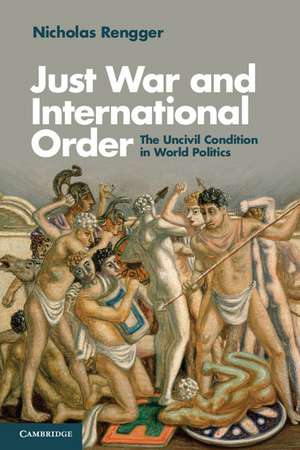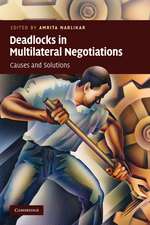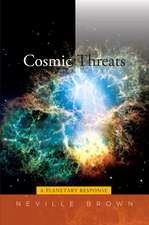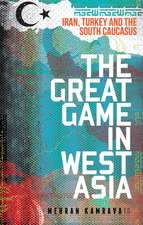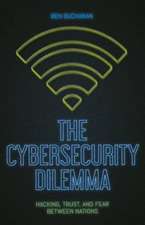Just War and International Order: The Uncivil Condition in World Politics
Autor Nicholas Renggeren Limba Engleză Paperback – 3 apr 2013
| Toate formatele și edițiile | Preț | Express |
|---|---|---|
| Paperback (1) | 209.56 lei 6-8 săpt. | |
| Cambridge University Press – 3 apr 2013 | 209.56 lei 6-8 săpt. | |
| Hardback (1) | 553.13 lei 6-8 săpt. | |
| Cambridge University Press – 3 apr 2013 | 553.13 lei 6-8 săpt. |
Preț: 209.56 lei
Nou
Puncte Express: 314
Preț estimativ în valută:
40.10€ • 41.87$ • 33.19£
40.10€ • 41.87$ • 33.19£
Carte tipărită la comandă
Livrare economică 04-18 aprilie
Preluare comenzi: 021 569.72.76
Specificații
ISBN-13: 9781107644748
ISBN-10: 1107644747
Pagini: 220
Dimensiuni: 152 x 226 x 18 mm
Greutate: 0.36 kg
Ediția:New.
Editura: Cambridge University Press
Colecția Cambridge University Press
Locul publicării:New York, United States
ISBN-10: 1107644747
Pagini: 220
Dimensiuni: 152 x 226 x 18 mm
Greutate: 0.36 kg
Ediția:New.
Editura: Cambridge University Press
Colecția Cambridge University Press
Locul publicării:New York, United States
Cuprins
Introduction; 1. Disordered world; 2. War music: social imaginaries of war in the modern age; 3. Just war: ambiguous tradition; 4. Force for good?; 5. Supreme emergency; Epilogue: a choice not a destiny.
Recenzii
'A literate and persuasive account in the context of just war and intervention of how reason coupled with good intentions can unwittingly help expand state authority and the use of force at home and abroad. Rengger's arguments also show how historically informed reason coupled with a deeper understanding of community can provide compelling arguments for restraint.' Richard Ned Lebow, King's College London
'Rengger is a prominent figure in the field of International Political Theory, and this book, which is the product of his long-term engagement with the just war tradition and the political philosophy of Michael Oakeshott, provokes scholars to think in new ways about the relation between military conflict and the normative foundations of international political life. It is a landmark text; insightful, daring, and a pleasure to read.' Cian O'Driscoll, University of Glasgow
'Rengger's remarkable fusion of political philosophy and international relations theory yields a potent critique of recent dreams of creating a better world by ethically grounded force. His analysis of how disastrous good intentions inspired by the current rhetoric of universal justice and human rights may prove is indispensable for understanding what is sometimes described as the post-Westphalian world order.' Noël O'Sullivan, University of Hull
'Harnessing an impressive array of literatures across the fields of political theory, international relations and international legal theories, political theology and the history of warfare, Nicholas Rengger has written a subtle set of arguments against recent and contemporary practices of moral interventionism … this book stands out for its philosophical sophistication, its singular use of intellectual history and the measured consistency of its own argument.' Richard Beardsworth, International Affairs
'This penetrating analysis … argues that the revival of just war thinking after WWII has helped to expand rather than constrain, the use of force in international relations … Recommended. Graduate, research, and professional collections.' M. Amstutz, Choice
'Rengger is a prominent figure in the field of International Political Theory, and this book, which is the product of his long-term engagement with the just war tradition and the political philosophy of Michael Oakeshott, provokes scholars to think in new ways about the relation between military conflict and the normative foundations of international political life. It is a landmark text; insightful, daring, and a pleasure to read.' Cian O'Driscoll, University of Glasgow
'Rengger's remarkable fusion of political philosophy and international relations theory yields a potent critique of recent dreams of creating a better world by ethically grounded force. His analysis of how disastrous good intentions inspired by the current rhetoric of universal justice and human rights may prove is indispensable for understanding what is sometimes described as the post-Westphalian world order.' Noël O'Sullivan, University of Hull
'Harnessing an impressive array of literatures across the fields of political theory, international relations and international legal theories, political theology and the history of warfare, Nicholas Rengger has written a subtle set of arguments against recent and contemporary practices of moral interventionism … this book stands out for its philosophical sophistication, its singular use of intellectual history and the measured consistency of its own argument.' Richard Beardsworth, International Affairs
'This penetrating analysis … argues that the revival of just war thinking after WWII has helped to expand rather than constrain, the use of force in international relations … Recommended. Graduate, research, and professional collections.' M. Amstutz, Choice
Notă biografică
Descriere
Argues the just war tradition, rather than being a restraint on war, has expanded its scope, and criticises this trend.
